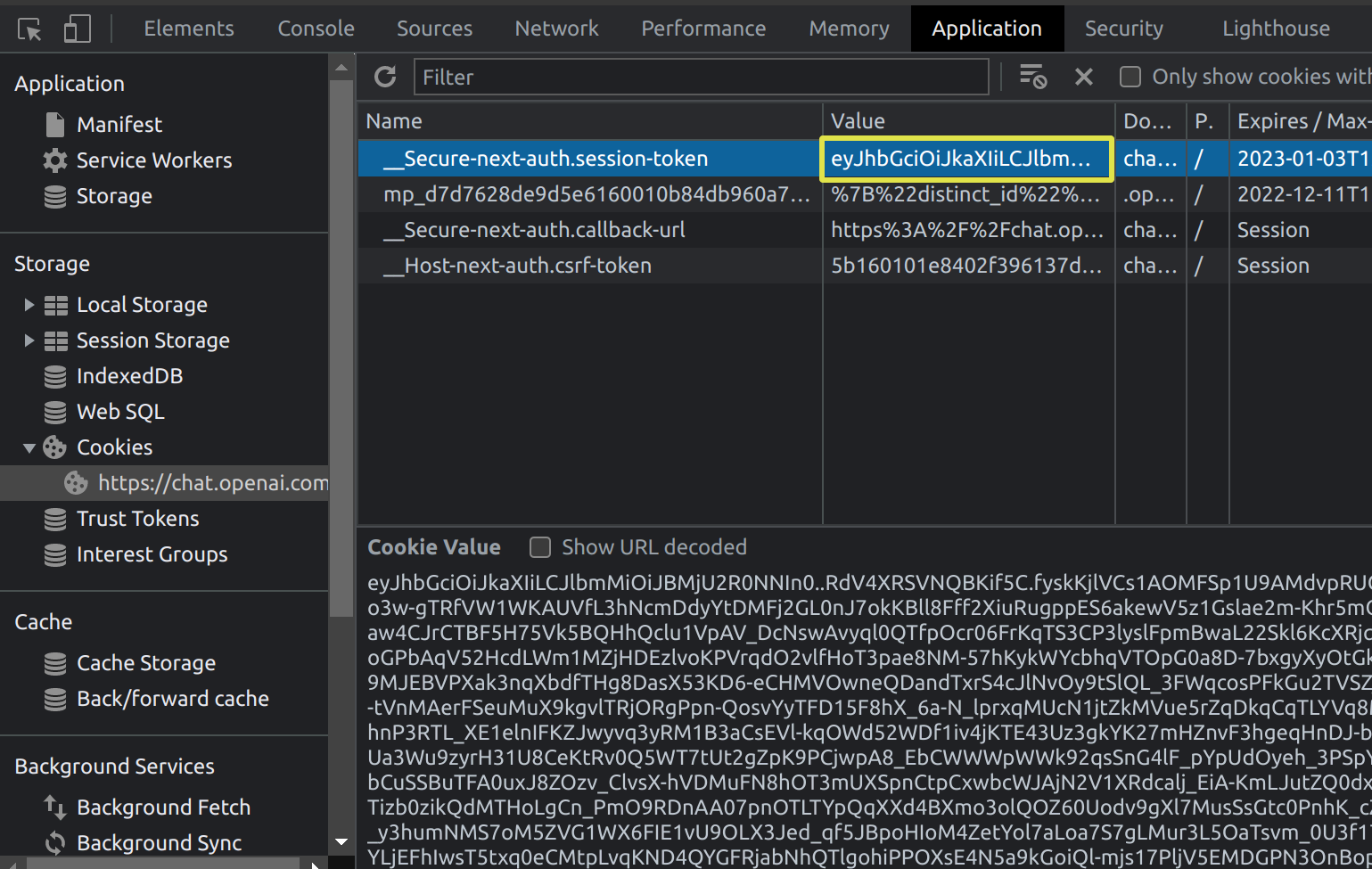|
|
||
|---|---|---|
| .github | ||
| .husky | ||
| docs | ||
| media | ||
| src | ||
| .env.example | ||
| .gitignore | ||
| .npmrc | ||
| .prettierignore | ||
| .prettierrc.cjs | ||
| license | ||
| package.json | ||
| pnpm-lock.yaml | ||
| readme.md | ||
| tsconfig.json | ||
| tsup.config.ts | ||
| typedoc.json | ||
readme.md

ChatGPT API
Node.js client for the unofficial ChatGPT API.
Intro
This package is a Node.js wrapper around ChatGPT by OpenAI. TS batteries included. ✨
You can use it to start building projects powered by ChatGPT like chatbots, websites, etc...
Install
npm install chatgpt
Usage
import { ChatGPTAPI } from 'chatgpt'
async function example() {
// sessionToken is required; see below for details
const api = new ChatGPTAPI({
sessionToken: process.env.SESSION_TOKEN
})
// ensure the API is properly authenticated
await api.ensureAuth()
// send a message and wait for the response
const response = await api.sendMessage(
'Write a python version of bubble sort.
)
// response is a markdown-formatted string
console.log(response)
}
ChatGPT responses are formatted as markdown by default. If you want to work with plaintext instead, you can use:
const api = new ChatGPTAPI({
sessionToken: process.env.SESSION_TOKEN,
markdown: false
})
If you want to automatically track the conversation, you can use ChatGPTAPI.getConversation():
const api = new ChatGPTAPI({
sessionToken: process.env.SESSION_TOKEN
})
const conversation = api.getConversation()
// send a message and wait for the response
const response0 = await conversation.sendMessage('What is OpenAI?')
// send a follow-up prompt to the previous message and wait for the response
const response1 = await conversation.sendMessage('Can you expand on that?')
// send another follow-up to the same conversation
const response2 = await conversation.sendMessage('Oh cool; thank you')
Sometimes, ChatGPT will hang for an extended period of time before beginning to respond. This may be due to rate limiting or it may be due to OpenAI's servers being overloaded.
To mitigate this issues, you can add a timeout like this:
// timeout after 2 minutes (which will also abort the underlying HTTP request)
const response = await api.sendMessage('this is a timeout test', {
timeoutMs: 2 * 60 * 1000
})
Usage in CommonJS (Dynamic import)
async function example() {
// To use ESM in CommonJS, you can use a dynamic import
const { ChatGPTAPI } = await import('chatgpt')
const api = new ChatGPTAPI({
sessionToken: process.env.SESSION_TOKEN
})
await api.ensureAuth()
const response = await api.sendMessage('Hello World!')
console.log(response)
}
Docs
See the auto-generated docs for more info on methods and parameters.
Demos
A basic demo is included for testing purposes:
# 1. clone repo
# 2. install node deps
# 3. set `SESSION_TOKEN` in .env
# 4. run:
npx tsx src/demo.ts
A conversation demo is also included:
# 1. clone repo
# 2. install node deps
# 3. set `SESSION_TOKEN` in .env
# 4. run:
npx tsx src/demo-conversation.ts
Session Tokens
This package requires a valid session token from ChatGPT to access it's unofficial REST API.
To get a session token:
- Go to https://chat.openai.com/chat and log in or sign up.
- Open dev tools.
- Open
Application>Cookies.
- Copy the value for
__Secure-next-auth.session-tokenand save it to your environment.
If you want to run the built-in demo, store this value as SESSION_TOKEN in a local .env file.
Note This package will switch to using the official API once it's released.
Note Prior to v1.0.0, this package used a headless browser via Playwright to automate the web UI. Here are the docs for the initial browser version.
Projects
All of these awesome projects are built using the chatgpt package. 🤯
- Twitter Bot powered by ChatGPT ✨
- Mention @ChatGPTBot on Twitter with your prompt to try it out
- Chrome Extension (demo)
- VSCode Extension #1 (demo)
- VSCode Extension #2 (marketplace)
- VSCode Extension #3 (marketplace)
- Raycast Extension (demo)
- Go Telegram Bot
- GitHub ProBot
- Discord Bot
- WeChat Bot
- Lovelines.xyz
- EXM smart contracts
- Flutter ChatGPT API
If you create a cool integration, feel free to open a PR and add it to the list.
Compatibility
This package is ESM-only. It supports:
- Node.js >= 16.8
- If you need Node.js 14 support, use
v1.4.0
- If you need Node.js 14 support, use
- Edge runtimes like CF workers and Vercel edge functions
- Modern browsers
- Mainly meant for chrome extensions where your code is protected to a degree
- We recommend against using
chatgptfrom client-side browser code because it would expose your private session token - If you want to build a website using
chatgpt, we recommend using it only from your backend API
Credits
- Huge thanks to @RomanHotsiy, @ElijahPepe, and all the other contributors 💪
- The original browser version was inspired by this Go module by Daniel Gross
- The original REST version was inspired by chat-gpt-google-extension by @wong2
License
MIT © Travis Fischer
If you found this project interesting, please consider sponsoring me or following me on twitter


